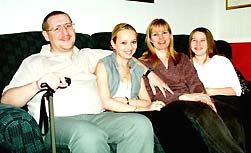| The United Kingdom sent 53,000 soldiers,
second only to the US, to join the multinational
forces in the 1991 Gulf War in the Middle
East. Of these, about 30,000 went to the
front lines and were stationed in and around
the desert battlefields. These British troops,
along with the Americans, used depleted uranium
(DU) munitions against the Iraqis, and won
an overwhelming victory. The UK lost 49 soldiers
in combat, but nine years later, more than
ten times that number have died, and 6,000
complain of a variety of physical disorders.
The veterans are still unable to obtain their
government's recognition that they are suffering
because of exposure to DU and other toxic
materials. For most, life is a day-to-day
struggle. (Story and photo by Akira Tashiro, senior
staff writer)
|
| Serving the country, paying a high price Losing strength, premonitions of death |
  Ray Bristow enjoying his family. "When
my health gets bad, I'm afraid I sometimes
take it out on them." (Kingston upon
Hull, England) Ray Bristow enjoying his family. "When
my health gets bad, I'm afraid I sometimes
take it out on them." (Kingston upon
Hull, England) |
About 300 kilometers (190 miles) north of
London, the city of Kingston upon Hull in
north-east England where the Humber River
empties into the North Sea was once a thriving
fishing port. I visited Ray Bristow (42)
at his home in the northern part of this
town of 250,000.
![]() Two months in the Persian Gulf
Two months in the Persian Gulf
"My legs have no strength at all. I haven't been able to walk without support for a long time." Bristow, who had come out to welcome me, leaned on a cane as he headed for the living room. He sat down on the sofa. "I was only in the Gulf a little over two months, but my body has never been the same." He spoke slowly, controlling his intense regret.
After graduating from high school, he got a social dance instructor's license and taught classes at night while working days as a medical technician in the operating theatre of the local hospital. At 17, thinking, "I want to do something for my country," he signed up with the Territorial Army and trained on weekends.
In November 1990, three months after Iraq invaded Kuwait, he was asked to join the military medical staff and go to the Middle East.
"It seemed to me the time had come to do something for my country with the training I'd received in the operating theatre and from the military." Without even consulting his wife Deborah (35), a nurse, he decided to participate in the war. He left her and his daughters Rachael and Claire (now 14 and 13) to fly to Saudi Arabia in early January 1991.
At a 200-bed field hospital near the Iraqi border, he was involved in treating injured soldiers. "Nearly all our patients were Iraqi soldiers. Especially during the ground war (February 24 to 28), we got them with severed legs or their guts hanging out. It was really horrible." And as he helped to remove clothes from these patients, the air filled with a fine dust.
Accustomed to gruesome sights in the operating
theatre, Bristow was not particularly shocked
by the injuries. "I just hated to see
these young guys, who were perfectly healthy
before the war, coming in with these horrible
injuries and dying. It was very sad. All
this made me see the extremely high price
of war." As he recalled that price,
Bristow's eyes glistened with tears. He certainly
never dreamed at the time that he would pay
with his own health.
![]() Getting home, getting sick
Getting home, getting sick
Bristow's health began to fail just as he came home on March 15. He started having headaches, general fatigue, digestive problems, and other symptoms. He had no information whatsoever about illnesses associated with the Gulf War. In 1993, while in a hospital, he happened to glance at an article in a women's magazine. "It talked about a Gulf War veteran's physical problems and loss of memory, and it seemed to be describing my own case."
He showed the article to his wife, and that triggered their effort to find the cause of his illness and a treatment. His worsening condition forced him to quit the hospital in 1996. At about that time, he was asked to take part in a study by a Canadian expert testing for depleted uranium. A high level was detected.
"I wasn't out on the front so I was
really surprised. I'm sure now that it came
from breathing in the dust on the clothes
of those injured Iraqis." He remembers
that dust clearly. He contacted the Ministry
of Defence for help, but all they said was,
"There's nothing to worry about."
He got nothing from them.
![]() Future is slow death
Future is slow death
Despite nutritional treatments and various medicines, Bristow is growing weaker. His joint pain is worsening. He is rapidly losing his memory. "At this point, I'm just waiting my turn to die. It's like the slow death of the survivors of Hiroshima and Nagasaki."
A gloomy hospital-driven life fighting disease with no hope in sight. "The only thing that gives me any relief is that my wife and daughters now understand my condition." As he said this, Bristow traded smiles with his daughters, who were just arriving home from school.